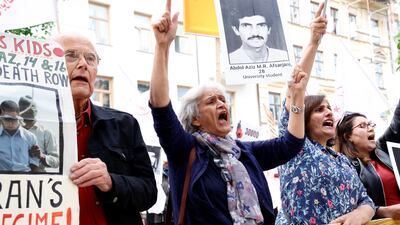A lowly clerk facing war crimes charges at a landmark trial in Sweden is expected to give evidence under oath for the first time on Tuesday about the massacre of prison inmates in 1998 that allegedly implicates current President Ebrahim Raisi.
Hamid Nouri, 60, is scheduled to start at least three days of evidence, more than three months after the start of a trial that has heard graphic testimony from victims about mass hangings, torture and brutal summary justice.
Lawyers for the former assistant to the deputy prosecutor at Gohardasht prison near Tehran have indicated that Mr Nouri will claim that he was not working at the prison at the time of the killings.
During the trial in the capital Stockholm, former inmates identified Mr Nouri as playing a key role in lining up prisoners and organising the mass hangings of former regime dissidents at the jail.
The primary targets of the regime were members of the Mujahideen-e-Khalq (MeK) who supported the 1979 revolution but then turned against the new leadership and fought for Iraq, under Saddam Hussein, during the war.
The prison killings were an act of revenge ordered by supreme leader Ayatollah Ruhollah Khomeini days after the end of the 1980-1988 war.
Rights groups say about 5,000 people were killed in prisons across the country, but the opposition claim that the number was six times that figure.
Mr Nouri, 60, who is accused of more than 100 murders, is accused by witnesses of helping a four-man “death committee” at the jail in Karaj, near Tehran, which included a youthful young prosecutor, Ebrahim Raisi. When he was asked about the 1998 massacres after his presidential victory this year, Mr Raisi said that a prosecutor “should be praised” for defending the “security of the people”.
One former inmate at Iran’s Gohardasht prison, Saheb Jam, said he watched Mr Nouri call out the names of inmates to be taken away for execution.
He “held a box of pastries and offered sweets to prison guards as they passed by”, he told the court. “They were celebrating the executions with sweets.”
Kenneth Lewis, one of the lawyers representing victims in the court, said: “The defence has asked for four days for the interrogation of Hamid Nouri – so he plans to talk.
“We still have no clear idea what he wants to talk about because he claims he wasn’t present at Gohardasht at the time of the massacres.”
Observers said Mr Nouri has interrupted sessions of the court to complain about protesters outside the court calling for justice for senior members of the Iranian government over their alleged involvement in the killings. An opposition group said they would stage a larger demonstration when Mr Nouri gives evidence on Tuesday.
Mr Lewis said that Mr Nouri had been a “loyal supporter” of the Iranian government and had interrupted the court when witnesses said anything derogatory about the senior leadership.
The hearings returned to Stockholm this week after the court decamped to the Albanian port of Durres to hear evidence from seven witnesses unable to travel to Sweden. One of the witnesses, Mohammad Zand, told the court last week that he had seen Mr Nouri taking people to be executed, according to his lawyer.
Mr Nouri stayed in Stockholm, where he has been held in custody since November 2019 after travelling to Sweden to visit family. Regime opponents alerted Swedish officials about his arrival and handed over a dossier of evidence.
Mr Nouri is being prosecuted under the principle of universal jurisdiction, which means that courts in Sweden can try a person on serious charges regardless of where and when the alleged offences took place.
“The 1988 massacre is in the DNA of the theocratic regime,” said Shahin Gobadi, of the National Council of Resistance of Iran, an umbrella group that includes the MeK. “The impunity that the regime’s leaders have enjoyed, should come to an end and they should be held accountable.”
A verdict in the case is expected in April 2022.


